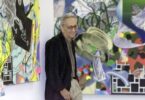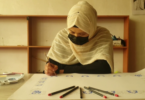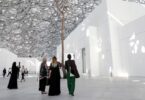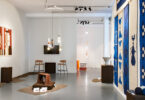Maan Jalal
Asense of stillness envelopes the viewer at Emirati conceptual artist Afra Al Dhaheri’s solo exhibition at Green Art Gallery.
It’s a space of silence, drawing the audience to observe sculptures of monumental and humble scale. They are made of familiar materials, but are presented in intriguing and unfamiliar ways.
Titled Give Your Weight to the Ground, the exhibition features six sculptures and two paintings that, when experienced collectively, invite the viewer to slow down.
“With this show I really focused on the audience, because we’re all in this accelerating wave together,” Al Dhaheri tells The National.
“Whether artists or not, we’re all experiencing this fast shift and movement in our life. And I think that this idea of ‘please slow down’ was one of the things that occurred to me.”
:quality(70)/cloudfront-eu-central-1.images.arcpublishing.com/thenational/XXK6OHIG6BEYNHF6JMLZSEUZMM.jpg)
Al Dhaheri is a multidisciplinary artist. Here, the materiality of her sculptural works, which include rope, stained wood, bobby pins and concrete cinderblocks, work on dual planes. While inviting the viewer to observe their natural state, they also conceptually create connections between body and the land.
For Al Dhaheri, the root of the idea began with strands of hair. In her artist statement for the show, she describes the moment her mother once told her to take her fallen hair and bury it in the soil of the house plant to nourish it. This memory became a starting point for Al Dhaheri to think about the ways our bodies return to the earth to nurture it.
Hair in particular was a veiled concept, both figuratively and literally, that Al Dhaheri felt inexorably drawn to.
When she was 10 years old, her hair was almost to her knees. When she asked why her hair was so long, her mother would tell her that that her grandmother would be upset if it was cut short.
“My mum married young and she was conforming to these social ideologies,” she says. “Hair touches on different layers of cultural ideologies, whether it’s the representation or the public image, versus the hair being present or absent in a situation.”
Al Dhaheri explored the theme of hair in her first solo exhibition, Split Ends, in Green Art Gallery in January, 2021. Her work then focused on the materials used, where she explored her personal relationship with hair and presented the findings in a more literal light.
In her current exhibition, she takes the concept further, breaking down ideologies of hair, from personal reference points to societal ones, and transforming those into universal concepts linked to the body and the landscape.
Hair is instantly intimate, Al Dhaheri observes, laboriously maintained and yet obscured from the public in some cultures. It’s rooted from the body while also existing outside of it. This is a similarity Al Dhaheri found to how trees and their roots exist as both part of the earth and outside of it.
:quality(70)/cloudfront-eu-central-1.images.arcpublishing.com/thenational/GMY4ZJIZ5JFUDDISRPBEJOYF3E.jpg)
“There are so many moments where hair was able to represent a lot of cultural ideologies without having to speak about them in particular one by one but it insinuates that relationship,” she says.
Al Dhaheri plays with a variety of elements throughout the exhibition, from scale and geometry to hard and soft forms, presenting both thoroughly crafted works and the natural textures of materials. Her sculptures feel like monuments, curated in a way that speak to one another and the audience in tandem.
Despite the range of varying materials and the aesthetic forms of her sculptures, the exhibition is unified through a hard-to-pin thread, perhaps explained through Al Dhaheri’s method of working.
“I usually work very simultaneously,” she says. “I’d be installing the ropes and then my shoulders will hurt so I need to do something else, which would require different movements or when I’m waiting for things to dry, I would start something else.”
Producing work concurrently frames and infuses it with the same energy. However, when this organic method of creating is coupled with Al Dhaheri’s conscious and focused approach to what she wants to communicate to the viewer, the result is all consuming.
“All I want to say is ‘please, slow down’ and I was thinking about ways to do that without saying it,” she says.
Utilising her large studio space at a warehouse in Abu Dhabi, she built the Green Art Gallery’s walls to scale to experiment how she would guide her audience and how people would experience the show.
“There were four different shows that happened in that space until finally arriving to what this show needs to be,” she says.
After much experimentation, Al Dhaheri understood how she would remind her audience to slow down – a sound work was scrapped from the final exhibition and silence became an important element in the work.
“I wanted to give the audience what does not exist in every space that we exist in,” she says. “I wanted to remind people at least an idea of what it could be like to slow down.”
Courtesy: thenationalnews







